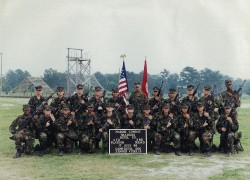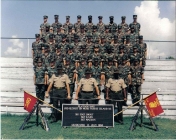Specialty Summary. Acquires, processes, identifies, analyzes, and reports on electromagnetic emissions. Operates electronic equipment and computer systems to exploit signals intelligence production efforts.
Duties and Responsibilities: Performs communication signals intelligence production and analysis, to include acquiring signals through optimum antenna manipulation and receiver tuning. Utilizes a wide range of complex analysis hardware and software to process signals, including receivers, demodulators, spectrum analyzers, and other associated computer equipment. Uses advanced computer software programs to manipulate and extract intelligence data from electromagnetic emissions. Operates computer terminals for data entry, query, data restructuring, and signals development.
Studies, analyzes, and identifies electromagnetic emissions. Uses graphic reproductions to determine internal characteristics of signals and to discern communications structures to extract intelligence and determine usage.
Processes signals. Extracts electromagnetic emissions from real-time and recorded media, and performs technical and data analysis. Prepares and forwards media of selected transmissions.
Interprets and renders preliminary analysis. Uses analytical aids and related reference material to help identify signals and detect abnormalities. Maintains databases of various signal types and activities using computer and hard copy products. Notifies appropriate personnel and work centers of unusual activities or critical situations.
Identifies, analyzes, and implements taskings. Generates reports, incorporating analytical finds with intelligence information. Annotates and forwards operational characteristics of selected transmissions or reportable information. Evaluates records, operator logs, formats, technical reports, and data from other activities and correlates the activity with other intelligence sources.
Applies and supports Information Operations Technologies. Uses information systems to plan, conduct, and execute Computer Network Operations (CNO) techniques.
Develops, manages, reviews, and evaluates intelligence production processes. Ensures signal exploitation activities are conducted in support of warfighter requirements and satisfies national and tactical tasked objectives. Supports intelligence agencies including the National Security Agency, Defense Intelligence Agency, Homeland Security, and the Central Intelligence Agency.
Specialty Qualifications:
Knowledge. Knowledge is mandatory of: intelligence and cryptologic support operations provided to commanders, service cryptologic elements, and national agencies; joint service relationships and operational concepts; tasking strategies; communications networks, radio wave propagation; modulation theory and techniques; radio communications procedures; basic signals analysis and identification; functions and operations of electronic equipment; reporting formats and procedures; basic computer operations; directives for handling, distributing, and protecting defense information; cryptologic systems operations; multi-mode communications equipment and techniques; mission management responsibilities; and related cryptologic activities.
Education. For entry into this specialty, completion of high school with courses in algebra, typing, and computers is desirable.
Training. For award of AFSC 1N231, completion of the communication signals collection and processing course is mandatory.
Experience. The following experience is mandatory for award of the AFSC indicated:
1N251. Qualification in and possession of AFSC 1N231.
1N271. Qualification in and possession of AFSC 1N251.
Other. The following are mandatory as indicated: For entry into this specialty: No record or history of temporomandibular joint pain or disorder. Specialty requires routine access to Top Secret material or similar environment. For award and retention of AFSCs 1N2XX, completion of a current Single Scope Background Investigation (SSBI) according to AFI 31-501, Personnel Security Program Management. NOTE: Award of the 3-skill level without a completed SSBI is authorized provided an interim Top Secret clearance has been granted according to AFI 31-501.




